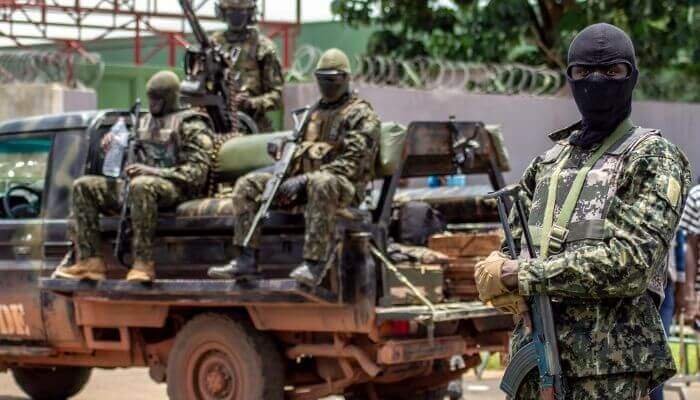Ghana’s recent procurement of armoured personnel carriers (APCs) has triggered controversy and outrage, as a damning petition accused the former government and military leadership of endangering troops, mismanaging public funds, and engaging in deceptive procurement practices.
Mr. Ola Durojaiye, known by the alias Kwame Danquah, has formally petitioned President Mahama to launch a value-for-money audit into the Ghana Armed Forces’ (GAF) acquisition of 20 BTR-70 APCs.
The petitioner noted that these vehicles were originally manufactured in the former Soviet Union in the late 1960s and described in the petition as obsolete, defective, and wholly unfit for deployment.
According to the petition, these armoured personnel carriers were purchased through a company identified as Double ST Limited, with the vehicles originating from Azerbaijan.
“The BTR-70 APCs procured for the Ghana Army were retrofitted with diesel engines; however, the essential accompanying components, such as radiators and hoses, were omitted, rendering the vehicles inefficient and defective. Additionally, the vehicles were delivered in advanced stages of wear and tear, highlighting their outdated condition.”
Mr. Ola Durojaiye
The issue at hand goes far beyond simply acquiring outdated equipment. According to the petition, the armoured personnel carriers were delivered in a heavily worn state, underscoring just how aged and degraded they truly were.

To make matters worse, they arrived without their primary weapon systems—the 14.5mm KPVT heavy machine guns. Although these were eventually delivered in 2024, they have yet to undergo testing because the vehicles remain largely nonfunctional.
In a bid to create a semblance of readiness ahead of a high-profile commissioning ceremony led by then-President Nana Akufo-Addo, members of the Electrical and Mechanical Engineering Corps had to repaint the exteriors and refurbish the interiors.
This effort, as noted by Durojaiye, was not a genuine attempt to restore the vehicles’ effectiveness but rather a cosmetic fix intended to conceal their poor condition.
Vehicles, “Death Traps”
The controversy deepens with the operational reality of the APCs. Following their commissioning, seven of the 20 BTR-70s were deployed to Abyei, Sudan, to support Ghanaian peacekeepers under the United Nations Interim Security Force for Abyei (UNISFA).
However, Mr. Ola Durojaiye noted, they were transported by trailers—an unusual move for operational military hardware—due to their inability to move under their own power.
The Forward Repair Team (FRT) sent to Sudan confirmed what the troops had feared: the vehicles were nonfunctional, consuming excessive fuel and overheating after short journeys.

The few that could operate at all were cannibalized for parts, with one barely mobile vehicle relying on alternators salvaged from others.
“It’s disheartening. The APCs arrived with numerous defects—oil leaks, malfunctioning brakes and clutches, unserviceable rear cameras, and missing communication devices. Even side mirrors were unusable.”
Mr. Ola Durojaiye
And critically, their windshields—made of plastic and not bulletproof—left operators exposed to small arms fire, an unacceptable risk for any peacekeeping force.
The alleged procurement fraud is particularly galling in light of Ghana’s history. In the early 2000s, BTR-60s were deployed under the United Nations Mission in Sierra Leone (UNAMSIL) with similarly disastrous results.
Yet the BTR-70—a marginally improved model, also long retired by its manufacturers—was still chosen decades later. The petitioner raised a chilling question: “Was this prior experience not sufficient warning to avoid this make of APC entirely?”
The BTR-70’s production ceased in 1984 with the introduction of the BTR-80, a more advanced vehicle that has since evolved into the BTR-82A.
Mr. Ola Durojaiye indicated that despite this, documents falsely claim that the BTR-70s delivered to Ghana were manufactured in 2002—an allegation that, if proven, would point to deliberate fraud.
Perhaps the most jarring revelation is the price: each vehicle reportedly cost $440,000, amounting to a total of $8.8 million in public expenditure. For what? According to the petition, nothing that resembles operational capability.
APC Procurement Puts Troop At Risk
Moreover, Mr. Ola Durojaiye contended that the procurement deal not only represents a poor use of public funds but also places Ghanaian troops at significant risk and erodes their morale.
He described the APCs as nothing more than deteriorated metal shells, unfit for any peacekeeping role, and argued that they should never have been considered, much less purchased, for such a critical mission.
His demand for a formal investigation aligns with concerns recently voiced by President Mahama.

During the commissioning of Regular Career Course Intake 63 at the Ghana Military Academy on April 11, 2025, the President emphasized the imperative for military leadership to put the well-being and safety of their personnel first.
“The decision to procure outdated APCs undermines military esprit de corps and goes against the principle of prioritising troops’ welfare over officers’ comfort or personal gain…It reflects a lack of protection and appropriate equipment necessary for executing their duties.”
Mr. Ola Durojaiye
His plea to President Mahama is clear and pointed: conduct a comprehensive audit of the procurement process and determine if any benefits—financial or operational—have accrued to the nation or its armed forces.
The petition concluded with a grim reminder that Ghana’s troops deserve more than outdated relics and empty promises. They deserve equipment that functions, leadership that values their safety, and transparency in how billions in public funds are spent.
Whether this scandal will lead to real accountability or be quietly buried remains to be seen. But one thing is clear: when national defense becomes a marketplace for obsolete machinery, it’s not just money that’s wasted—it’s trust, morale, and the lives of those sent to serve.
READ ALSO: Equatorial Guinea Seals Deal to Build New Oil Refinery























